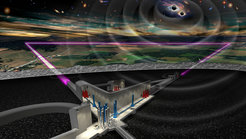NRW state parliament unanimously supports Einstein Telescope
The state parliament of North Rhine-Westphalia has unanimously pledged its support for the groundbreaking international science project Einstein Telescope (ET).

The Einstein Telescope (ET) is a planned European gravitational-wave detector of the latest generation. The North Rhine-Westphalia state parliament has discussed the project, which could be built in the area of Aachen-Liège-Maastricht, and decided to support its realization. The Italian island of Sardinia is another possible location for ET.
With the first direct detection of gravitational waves, the era of gravitational-wave astronomy has begun in 2015. German scientists have played a leading role in gravitational-wave research, which was awarded the Nobel Prize in 2017, from the very beginning. They have developed key technologies, new methods of data analysis and scientific principles. Their expertise is now being applied to the next generation of projects. If ET succeeds in establishing itself in the border region, the research cooperation in the Euregio Meuse-Rhine and the business location will be sustainably strengthened.
There will be only two next-generation gravitational-wave observatories worldwide in the coming decades: Cosmic Explorer (CE) in the USA and the Einstein Telescope (ET) in Europe. At the request of the CDU, SPD, FDP and BÜNDNIS90/DIE GRÜNEN parliamentary groups, the NRW State Parliament has now created an important basis for a possible realization of ET in the border region.
Key points from the resolution
The state parliament commissions the state government,
- first of all, to work for the recognition of the Einstein Telescope as a scientific project of national and European importance and, in addition, to support the scientific community's wish to add the Einstein Telescope to the list of large-scale research projects
- Together with the Netherlands and Belgium, to promote the Einstein Telescope at all levels and in particular to support the European Grouping for Territorial Cooperation Euregio Meuse Rhine in its activities in this field.
- to actively support the process of realizing the Einstein Telescope, by providing financial support for accompanying research projects, by focusing on the regional and economic policy dimension of the project and by strengthening cross-border and trilateral networking and cohesion in favour of the project.
- to make a commitment to the Federal Ministry of Education and Research to provide financial support for the planned construction of the Einstein Telescope with possible participation of the State of North Rhine-Westphalia.
The AEI in the international gravitational-wave research community
The Max Planck Institute for Gravitational Physics (Albert Einstein Institute, AEI) with locations in Potsdam and Hannover and the Leibniz University of Hannover have long been leading institutions in gravitational-wave research and initiators of the Einstein Telescope. The research focuses on numerical simulations of gravitational-wave sources, data analysis, quantum-limited interferometric measurements, laser development, and control and operation of gravitational-wave detectors.












